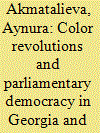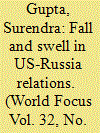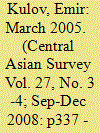|
|
|
Sort Order |
|
|
|
Items / Page
|
|
|
|
|
|
|
| Srl | Item |
| 1 |
ID:
127636


|
|
|
|
|
| Publication |
2013.
|
| Summary/Abstract |
The media of Kyrgyzstan described Georgia after the Rose Revolution of 2003 as a country that has made giant strides in economic recovery, suppressing corruption, and reform of its police and education system. The two countries increased their cooperation after the Tulip Revolution of 2010 in Kyrgyzstan; today, it has taken the form of an exchange of diplomatic and political experience and youth programs. Trade turnover between the two countries is expected to top $1.4 million.
These two Soviet successor-states, which adhere to different sociocultural and economic traditions, chose a practically identical road leading first to the presidential form of government and then to parliamentary democracies. This choice made after the color revolutions of 2003 in Georgia and 2005 and 2010 in Kyrgyzstan was suggested by the universal model of democracy that had gained popularity all over the world and was primarily a mechanism for legitimizing the power of the new people inside and outside the country. So far, parliamentary democracy in both countries has not developed enough to produce unambiguous results. It is much more important to understand how the changes were accepted and substantiated through an analysis of public discussions, discussions in the media and on the Internet, as well as in official documents, interviews, and statements by the leaders.
|
|
|
|
|
|
|
|
|
|
|
|
|
|
|
|
| 2 |
ID:
085530


|
|
|
|
|
| Publication |
2008.
|
| Summary/Abstract |
This contribution argues that analysis of the overthrow of President Askar Akaev in Kyrgyzstan in 2005 has tended to overemphasize external factors in the revolution, while underplaying local dynamics, which were complex, difficult to understand, and did not fit with a much simpler narrative of democratic change, inspired by external encouragement. In reality, popular discontent, mobilized by local elites in their support during a highly competitive electoral process, led to elite defection and cross-regional political alliances that severely undermined the Akaev regime. International engagement, and Western-funded NGOs and civil society groups played a much more marginal role than is normally portrayed. For the most part, Western groups engaged with an almost 'virtual' sphere of politics, in which NGOs and democracy groups predominated, but where there was little ability to influence the real world of the Kyrgyz polity.
|
|
|
|
|
|
|
|
|
|
|
|
|
|
|
|
| 3 |
ID:
108206


|
|
|
| 4 |
ID:
085529


|
|
|
|
|
| Publication |
2008.
|
| Summary/Abstract |
This article suggests that commentators have over-emphasized a 'democratic meaning' behind the 'Tulip Revolution', partly because of a certain misrepresentation of 'transition' in post-1990 Kyrgyzstan. The notion of political competition has been particularly important, a consistent feature of Kyrgyz politics that has suggested a liberalizing tendency in Kyrgyzstan. The nature of contestation, however, is at least partially linked to the traditional societal organization of the Kyrgyz ethnic group, and particularly to its multi-layered division into sub-ethnic groups that are in a state of stable competitive relationship to each other.
|
|
|
|
|
|
|
|
|
|
|
|
|
|
|
|
| 5 |
ID:
074032


|
|
|
| 6 |
ID:
085535


|
|
|
|
|
| Publication |
2008.
|
| Summary/Abstract |
Analyzing political opportunity structure in both the long and short terms, this article focuses specifically on the trigger effect of elections that provided the political space for oppositional leaders to frame their grievances. The emerging framework of understanding mobilization in the coloured revolutions combines stolen elections as a motivating trigger; an incumbent weakened by succession crisis and disunity of his power base; the semi-authoritarian character of pre-revolutionary politics; an opposition able to unite despite their inevitable differences and potentially important international factors. The specific mechanisms that translated stolen elections into mass demonstrations, succession crisis into a defeat of the incumbent and foreign example into a spillover effect, are not yet perfectly understood, and nor are their outcomes. The implications of how stolen and manipulated elections differ from each other are explored.
|
|
|
|
|
|
|
|
|
|
|
|
|
|
|
|
| 7 |
ID:
085532


|
|
|
|
|
| Publication |
2008.
|
| Summary/Abstract |
This contribution applies Easton's concept of political support to an analysis of north and south Kyrgyzstan. Testing alternative theories of geographical distribution of political support, the study seeks to understand the relationship between, on the one hand, political support for the regime and its institutions, and on the other, ethnicity, urbanization and region of residence. It rejects the hypothesis that the north tends to support the opposition and the south supports the president, arguing instead that the north is more pessimistic in general about the state and non-state institutions.
|
|
|
|
|
|
|
|
|
|
|
|
|
|
|
|
| 8 |
ID:
085531


|
|
|
|
|
| Publication |
2008.
|
| Summary/Abstract |
More than a decade of post-Soviet transition has given rise to political-criminal clans in Kyrgyzstan, thus blurring the boundaries between the legitimate sector and the criminal underworld. The Tulip Revolution, which is frequently referred to as an 'anti-crime' and an 'anti-corruption' event, was followed by increasing political violence and more powerful organized crime groups. This article looks at the reasons for these developments. It argues that the involvement of criminal figures in the revolutionary process, the weakness of the political opposition to Akaev's outgoing regime and post-revolutionary uncertainty and chaos were the main factors. After temporary confusion, the incoming elites mobilized resources, revitalized the corruption pyramid schemes and fought back criminal leaders in order to reassert themselves. Following the assassination of two of the most influential underworld leaders in unclear circumstances, the incumbent regime and new ruling family are progressively consolidating their power. So far, however, the increased power of the ruling regime has not strengthened the Kyrgyz state.
|
|
|
|
|
|
|
|
|
|
|
|
|
|
|
|
|
|
|
|
|